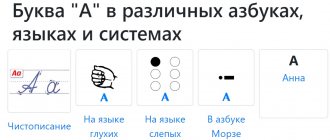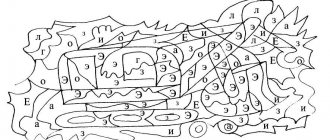literacy training. proposal. methodological development for teaching literacy (senior group) on the topic
Summary of a lesson on teaching literacy in the senior group
Compiled by: teacher of the Severokommunarsky Kindergarten MBDOU Olesya Aleksandrovna Chadova.
Lesson No. 2
Topic: Proposal. Getting to know the offer. Drawing up proposals. Proposal schemes.
Purpose: To clearly show that a sentence is made up of words.
Objectives: To train in determining the number and sequence of words in a sentence, in drawing up a sentence diagram. Comparisons of words and sentences as speech units. Develop attention, fine motor skills, correct, competent speech. Foster a culture of speech.
Equipment: pictures: mouse, cheese, question mark. Pictures for each child for making sentences. Checkered leaves for each child, a simple pencil.
Progress of the lesson:
- Mobilizing stage. Children formulate the topic and purpose of the lesson.
Think and answer, where is the sentence, and where is just a set of words? Explain how you guessed.
Walking, field, children, in. (do not convey thoughts)
The children were walking in the field.
That's right, I said a sentence. A sentence expresses a complete thought and has a special intonation. Based on this, formulate the topic of our lesson. What we're going to talk? (We will talk about the proposal).
What is the purpose of our lesson?
Complete the sentence: find out that ....; learn to distinguish…. and not....; learn to compose... from a set of words.
So, today in class we will learn what a sentence is. Let's learn how to make sentences. We will also get acquainted with the proposal scheme.
- Development of speech breathing.
The child takes a short deep breath and exhales slowly.
- Articulation gymnastics.
Smile, pipe, watch, brushing teeth.
- Learning new material.
So what is a proposal?
How many words can a sentence consist of?
Turn a short sentence into a long one according to the example: a stream is ringing - a fast stream is ringing merrily.
The sun is shining. The birds are singing. Flowers are blooming. The leaves are rustling.
- Physical education minute.
Hamster is a hamster.
- Learning new material (continued).
There are object pictures on the board.
?
Children must verbally compose a sentence of three words: the mouse loves cheese, and then repeat the sentence and indicate it with one long strip. (teacher on the board, children in notebooks).
How many words are there in a sentence? (three).
Words are indicated in the diagram by short lines. Children, as shown by the teacher, selectively name the second, third, first word (you can refer to the pictures).
- Consolidation of new material.
Make suggestions based on the pictures. Use sentence diagrams.
- Summary of the lesson.
What new and interesting things did you learn in today's lesson?
- Reflection.
Show your mood after class using gestures.
Lesson 3. Sound culture of speech. Working on a proposal
⇐ PreviousPage 6 of 18Next ⇒
Target. Improve phonetic perception, the ability to determine the number and sequence of words in a sentence. Continue working on the semantic side of the word.
Progress of the lesson
“How many of you have seen crystal things that sparkle in the light of lamps? - the teacher begins the conversation. – These could be... glasses, shot glasses, salad bowls, candy bowls, sconces, chandeliers. Or maybe an autumn day can be crystal clear?
In the original autumn there is a short but wonderful time - The whole day is as if crystal, And the evenings are radiant.
These lines were written by the wonderful Russian poet Fyodor Tyutchev. What amazingly precise and beautiful words are found in this quatrain. Did you hear? Initial autumn – what kind of autumn is this? What word can replace the word marvelous?
?»
The teacher explains what radiant evenings are. Then asks the children to count the number of words with the sound r
in the first two lines of the poem (repeats them) and name these words.
“Can you name the first two sounds in the word marvelous
.
Di
is part of the word.
There are other words starting with di-
.
Which? (Dima, Dina, Dinara, director, sofa...)
Let's look in the dictionary and find words starting with
di-.
So:
diet, diadem, savage, curiosity, porcupine, dynamo, disc, conductor
.
Are all the words familiar to you? And the tiara, the porcupine, the conductor
?
Determine in which part of the word the sound r
in the word
conductor
?
Next, the teacher invites the children to play the game “I am for you, you are for me” and reminds of its rules: “First I will say a sentence, and you will count the number of words in it and name them. Then one of you will say your sentence and I will count the number of words. So, how many words are in the sentence “The lingonberries are ripening, the days have become colder?”
Children count the words (4–5 answers), and then name the words in the order they appear in the sentence.
“Now let’s play differently,” says the teacher. - Dima, you keep up with
, Sasha has the word
lingonberry
, Ira
has steel,
Masha has
days
, Katya has
colder
. Come to my table and decide who will stand with whom, and then say the proposal.”
If confusion occurs, the game is repeated with other participants. (The reception was offered by G. Belyakova.)
Next, one of the children pronounces a sentence and asks the teacher to count and name the words in it. The teacher is given the task by 1-2 more children.
At the end of the lesson, the teacher reads to the children F. Tyutchev’s poem “There is in the original autumn...” or K. Balmont’s “Autumn.”
* * *
In the original autumn there is a short but wonderful time - The whole day is as if crystal, And the evenings are radiant...
Where the cheerful sickle walked and the ear fell, Now everything is empty - space is everywhere, - Only a thin hair of cobwebs Glistens on the idle furrow.
The air is empty, the birds are no longer heard, But the first winter storms are still far away - And clear and warm azure is pouring onto the resting field... F. Tyutchev
Autumn The lingonberries are ripening, the days have become colder, and the cry of birds makes my heart sadder.
Flocks of birds fly away, beyond the blue sea. All the trees shine in a multi-colored dress.
The sun laughs less often, There is no incense in the flowers. Soon autumn will wake up and cry awake. K. Balmont
Lesson 4. Retelling the story by V. Sukhomlinsky “The Apple and the Dawn”
Target. Improve the ability to retell and draw up a retelling plan.
Progress of the lesson
“Today I will read you a story written by the teacher, school director Vasily Sukhomlinsky,” the teacher begins the lesson. “The story is called “The Apple and the Dawn.”
…
Little Misha often came to his grandfather Korney’s garden. The grandfather treated his grandson to delicious apples, pears, and honey.
And Misha could not take his eyes off the huge, white, tender apple that glowed at the very top of one apple tree.
- Grandfather, dear, let me climb in and pick that apple over there.
“No,” answered the grandfather, “the apple will go to the one who comes to the garden at dawn and works for an hour: pours water for the bees, cuts dry twigs.”
How many times did Misha intend to come to the garden at dawn, but he could not overcome laziness.
Finally, I gathered my strength, opened my eyes while it was still dark, threw away the pillow and ran to my grandfather in the garden. He poured water for the bees and cut off dry twigs.
The morning star has risen. Misha approached the apple tree with the treasured apple, and it took his breath away. The huge apple at the very top was no longer white, but pink, like the sky at dawn.
- Well, now the apple is yours. “Climb and tear it off,” said the grandfather.
- No, grandfather... Better tomorrow.
- Why?
“I want to see the sunrise again.”
“If we can draw up a plan for the story, then we will be able to retell it without significant omissions and unnecessary repetitions,” the teacher continues the conversation. – Do you remember how the story begins? How can you briefly call this part of the story?
The teacher listens to the children’s answers and says that everything they talked about happened in Grandfather Korney’s garden: “I think that the first point of the plan should be called: “In Grandfather Korney’s garden.” And then the action of the story took place not in the garden, but where? And how did the action develop? Can this part of the story be called...? “Misha stopped being lazy”, “Misha conquered laziness”...
Did the boy get the treasured apple? How did Vasily Sukhomlinsky describe this apple? When did this apple become pink instead of white? (When the morning star rose.)
We have a plan. Now I will read the story again so that you remember it better.”
Then the teacher calls the child, and they retell the story together. The teacher ends his part with the words: “Grandfather, dear, let me climb up and pick that big apple.” The child retells the story further.
The teacher calls another child to retell the story, and he invites a peer.
“The apple in the story was... (huge, white, tender)
. What kind of apples have you come across? – the teacher asks, finishing the lesson.
⇐ Previous6Next ⇒
Recommended pages:
Use the site search:
MAGAZINE Preschooler.RF
Summary of an open literacy lesson “Proposal”Educational institution: MBOU DOD "CDT "YUZHNY" .
Teacher: Prudnikova Ekaterina Valerievna.
Type of lesson: consolidation of the material covered, learning new material.
Progress of the training session:
Greetings.
/The teacher enters the office dressed as Vasilisa the Wise to the music/
Teacher: Hello, guys! It's me again -
Wise girl
A jack of all trades.
I can do everything here and there
The name is Vasilisa! Today we will continue to travel through a magical land called..?
Teacher: Correct.
Far, far away, beyond the mountains, beyond the seas, beyond dense forests, beyond distant lands, in the Thirtieth Kingdom, in the Far Far Away State, there is a huge country,
It's called “Grammar” .
Teacher: But to get there we will need transport, but not simple, but what kind..?
Teacher: Of course, these are magic horses.
/The teacher asks the children to get up from the tables, hands out toy horses/
Organizes repetition of covered material
— orally:
Evaluates the work of a group of students (verbally)
Determines the activity of children, draws conclusions about their preparation.
Teacher: But these horses won’t just gallop. In order for them to take you and me to a magical land, we need to complete a task. You are ready?
Joke game
Where do you find errors?
/For mushrooms/
We played a little under the spreading oak tree and with a basket of mushrooms we went on foot to the forest.
The forest was dozing. Only the woodpeckers sang and the rooks whistled. A motorcyclist was riding a bicycle past us.
He says: -Where are you going? “For mushrooms,” he answers. -You probably won’t find:
They are not in the forest yet. And we went into the thicket of the forest - There are mushrooms. Such - wow! Unfortunately, at that time we
We didn't find any. Still, we managed to fill our small body. We sat near the spruce tree
And we went home.
Teacher: You completed the task, well done! We give me the magic horses and sit down in our seats.
So we found ourselves in the kingdom-state “Grammar” , where neither people nor animals live, but sounds, words, sentences, text.
As you already know, our speech consists of sentences. The beginning of a sentence is always capitalized. Words in a sentence are written separately. At the end of the sentence there is a period. Or you can put...
Teacher: Okay. If the sentence ends with “.” , then what is it?
If «?»
If «!»
Teacher: What does a sentence consist of?
What needs to be done to get an offer?
That's right, you need the words to become friends.
Performing an oral exercise.
There are pictures on the board. Make up any sentences with these words (doll, ball, tree).
After completing the task, the teacher changes the pictures. Now they hang on the board (chair, window, vase, rooster),
Work at the board. There are pictures on the board: butterfly, fish, candy, soap, ship. And 5 sentences are written. You need to complete the sentence by attaching the desired picture.
- I have a sweet tooth and really love_____.
- I swim like______.
- To wash my face cleaner, I take ______.
- ________ is resting on a flower.
- ________ floats on the sea.
Physical education minute:
We gather the kids to play a game. Show me, guys, how animals live in the forest. How the little fox wakes up
Like a baby squirrel washes itself, Like a little hare gallops, Like a wolf cub runs.
Teacher: We did forest exercises, well done. Now it's time to learn something new. Is everyone ready to listen carefully?
Teacher: Okay!
Teacher: Do you guys know that you can “Draw” ?
Teacher: Very simple. We will denote all the words in a sentence with dashes /draws on the board/, like this ________.
As many words as there are in a sentence, we will draw as many lines. We will mark capital letters with a stick /draws on the board/, like this I. Well, at the end of the sentence we will definitely put what?
Work at the board.
Teacher: Now look carefully at the board and answer me how many words are in the sentence.
I____ _____ ______.
I______ ______?
I______!
Teacher: Well done. Now you need to come up with a proposal using reference pictures and draw a diagram of the proposal:
Conversation, generalization and systematization of knowledge acquired on the topic “Proposal” .
Teacher: Well done. Today we learned that you can also draw a sentence, that is, draw up a diagram of the sentence. We'll talk more about the proposal scheme another time, but now it's time to go back.
And the magic horses will help us with this again.
/The teacher asks the children to get up from the tables, hands out toy horses/
Teacher: So we came back. And it’s time for me to return to the fairy tale, see you again!
| Next > |


